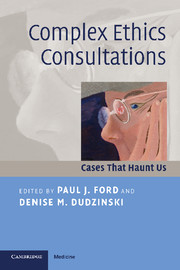Book contents
- Frontmatter
- Contents
- List of contributors
- Foreword
- Acknowledgments
- Introduction: Live and learn: courage, honesty, and vulnerability
- Part I Starting at the beginning: prenatal and neonatal issues
- Part II The most vulnerable of us: pediatrics
- Part III Diversity of desires and limits of liberty: psychiatric and psychological issues
- Part IV Withholding therapy with a twist
- Part V The unspeakable/unassailable: religious and cultural beliefs
- Part VI Human guinea pigs and miracles: clinical innovations and unorthodox treatment
- 21 Amputate my arm, please. I don't want it anymore
- 22 Feuding surrogates, herbal therapies, and a dying patient
- 23 One way out: destination therapy by default
- 24 Altruistic organ donation: Credible? Acceptable?
- Part VII The big picture: organizational issues
- Conclusions, educational activities, and references
- Index
21 - Amputate my arm, please. I don't want it anymore
Published online by Cambridge University Press: 03 May 2010
- Frontmatter
- Contents
- List of contributors
- Foreword
- Acknowledgments
- Introduction: Live and learn: courage, honesty, and vulnerability
- Part I Starting at the beginning: prenatal and neonatal issues
- Part II The most vulnerable of us: pediatrics
- Part III Diversity of desires and limits of liberty: psychiatric and psychological issues
- Part IV Withholding therapy with a twist
- Part V The unspeakable/unassailable: religious and cultural beliefs
- Part VI Human guinea pigs and miracles: clinical innovations and unorthodox treatment
- 21 Amputate my arm, please. I don't want it anymore
- 22 Feuding surrogates, herbal therapies, and a dying patient
- 23 One way out: destination therapy by default
- 24 Altruistic organ donation: Credible? Acceptable?
- Part VII The big picture: organizational issues
- Conclusions, educational activities, and references
- Index
Summary
Case narrative
I learned about Cindy during my routine attendance at multidisciplinary rounds. By attending rounds, I try to assist with emerging ethical issues before they become dilemmas and identify areas of ethical concern for resident physicians and other healthcare providers for discussion and education in various forums, both formal and informal. The resident physician gave me a basic history that prompted me to follow up on this patient.
Cindy Johnson is a 50-year-old woman who, 10 years ago, injured her wrist while working on an assembly line. Since the injury she has suffered from complex regional pain syndrome (CRPS) of her left hand and forearm. CRPS is a neuropathic pain disorder that arises after painful trauma affecting the limbs, a bone fracture, or as a consequence of stroke, spinal cord injury, or myocardial infarction.1,2 Since even a gentle breeze passing over Cindy's exposed skin causes excruciating pain and a burning sensation, she keeps her forearm protected with a bandage and a hard brace. She often rests her arm on a pillow – a minor protection and a visible sign to others to keep their distance. Cindy was admitted through the emergency department after seeking a continuous infusion of levobupivacaine to anesthetize her arm shortly after a dressing change. This was her first dressing change in over a year. Due in part to suboptimal hygienic management, she suffers from cellulitis and edema in her left hand and forearm. She also has joint contractures in her left hand and her muscles have atrophied from lack of use. Without more frequent dressing changes her cellulitis will spread, causing ulcers and recurrent infections. Despite Cindy's past cooperation with psychiatric, palliative, and physical therapies, her pain continues.
- Type
- Chapter
- Information
- Complex Ethics ConsultationsCases that Haunt Us, pp. 165 - 171Publisher: Cambridge University PressPrint publication year: 2008



